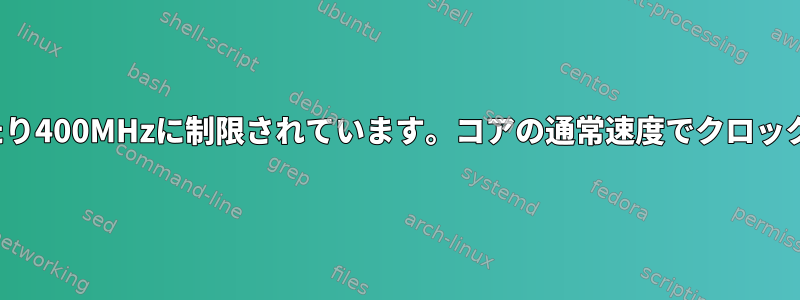
Lenovo ThinkPadとIntel CPUには、各コア周波数が400MHzに制限される一般的な問題があるようです。
- https://forums.lenovo.com/t5/ThinkPad-LR-and-SL-series/L380-stuck-on-0-4-GHz-when-loading/td-p/4333148
- https://www.reddit.com/r/thinkpad/comments/96gnur/yoga_370_cpu_stuck_at_038_ghz/
- https://www.reddit.com/r/thinkpad/comments/6uhu31/t470_cpu_throtdling_stuck_on_400_mhz_when_on/
興味深いことに、これはオペレーティングシステムだけに基づいたものではありません。この制限は、BIOSまたは診断でも発生する可能性があります。時々通常の速度に戻りますが、永遠ではありません。バッテリーが調整されると、バッテリーも充電されません。
何が原因なのか、解決策は何なのかについては明確な答えがないようです。私にとって、触媒は寝ながらノートパソコンを放電させた時のようでした。私は一週間この問題に対処しました。すでに私:
- 更新されたBIOS
- ロールバックBIOS
- 別の充電器を試してみました。
- バッテリーを取り外し、コンデンサを放電させます。
- 時計バッテリーの取り外し
- BIOSでCPU設定を変更する
- リセットするには長押しします。
新しいバッテリーの購入とコアの使用を除いて、ほぼすべての作業が完了しました。私が知っているのは、人々がバッテリーを新しいバッテリーに交換しようとしましたが、その解決策はしばらくの間効果がありました。
カーネルで何ができるか知りたいです。 C++、Qt、Cプログラミングはうまくいきますが、カーネルがわからず、CPUなどの経験もありません。
- この問題を処理するためにナビゲートできるカーネルモジュールはありますか?
- カーネルはクロック速度を強制的に高めることができますか?
- 私のコンピュータを通常のクロック速度に戻すことができるより効率的な既存のソリューションはありますか?
ありがとうございます。
編集:知事をスリープからパフォーマンスに変更した後も、同じ問題が発生します。
今後:
➜ ~ cpupower -c all frequency-info
analyzing CPU 0:
driver: intel_pstate
CPUs which run at the same hardware frequency: 0
CPUs which need to have their frequency coordinated by software: 0
maximum transition latency: Cannot determine or is not supported.
hardware limits: 400 MHz - 3.40 GHz
available cpufreq governors: performance powersave
current policy: frequency should be within 400 MHz and 3.40 GHz.
The governor "powersave" may decide which speed to use
within this range.
current CPU frequency: Unable to call hardware
current CPU frequency: 400 MHz (asserted by call to kernel)
boost state support:
Supported: yes
Active: yes
analyzing CPU 1:
driver: intel_pstate
CPUs which run at the same hardware frequency: 1
CPUs which need to have their frequency coordinated by software: 1
maximum transition latency: Cannot determine or is not supported.
hardware limits: 400 MHz - 3.40 GHz
available cpufreq governors: performance powersave
current policy: frequency should be within 400 MHz and 3.40 GHz.
The governor "powersave" may decide which speed to use
within this range.
current CPU frequency: Unable to call hardware
current CPU frequency: 400 MHz (asserted by call to kernel)
boost state support:
Supported: yes
Active: yes
analyzing CPU 2:
driver: intel_pstate
CPUs which run at the same hardware frequency: 2
CPUs which need to have their frequency coordinated by software: 2
maximum transition latency: Cannot determine or is not supported.
hardware limits: 400 MHz - 3.40 GHz
available cpufreq governors: performance powersave
current policy: frequency should be within 400 MHz and 3.40 GHz.
The governor "powersave" may decide which speed to use
within this range.
current CPU frequency: Unable to call hardware
current CPU frequency: 400 MHz (asserted by call to kernel)
boost state support:
Supported: yes
Active: yes
analyzing CPU 3:
driver: intel_pstate
CPUs which run at the same hardware frequency: 3
CPUs which need to have their frequency coordinated by software: 3
maximum transition latency: Cannot determine or is not supported.
hardware limits: 400 MHz - 3.40 GHz
available cpufreq governors: performance powersave
current policy: frequency should be within 400 MHz and 3.40 GHz.
The governor "powersave" may decide which speed to use
within this range.
current CPU frequency: Unable to call hardware
current CPU frequency: 400 MHz (asserted by call to kernel)
boost state support:
Supported: yes
Active: yes
後ろに:
➜ ~ sudo cpupower frequency-set -g performance
[sudo] password for anon:
Setting cpu: 0
Setting cpu: 1
Setting cpu: 2
Setting cpu: 3
➜ ~ cpupower -c all frequency-info
analyzing CPU 0:
driver: intel_pstate
CPUs which run at the same hardware frequency: 0
CPUs which need to have their frequency coordinated by software: 0
maximum transition latency: Cannot determine or is not supported.
hardware limits: 400 MHz - 3.40 GHz
available cpufreq governors: performance powersave
current policy: frequency should be within 400 MHz and 3.40 GHz.
The governor "performance" may decide which speed to use
within this range.
current CPU frequency: Unable to call hardware
current CPU frequency: 400 MHz (asserted by call to kernel)
boost state support:
Supported: yes
Active: yes
analyzing CPU 1:
driver: intel_pstate
CPUs which run at the same hardware frequency: 1
CPUs which need to have their frequency coordinated by software: 1
maximum transition latency: Cannot determine or is not supported.
hardware limits: 400 MHz - 3.40 GHz
available cpufreq governors: performance powersave
current policy: frequency should be within 400 MHz and 3.40 GHz.
The governor "performance" may decide which speed to use
within this range.
current CPU frequency: Unable to call hardware
current CPU frequency: 400 MHz (asserted by call to kernel)
boost state support:
Supported: yes
Active: yes
analyzing CPU 2:
driver: intel_pstate
CPUs which run at the same hardware frequency: 2
CPUs which need to have their frequency coordinated by software: 2
maximum transition latency: Cannot determine or is not supported.
hardware limits: 400 MHz - 3.40 GHz
available cpufreq governors: performance powersave
current policy: frequency should be within 400 MHz and 3.40 GHz.
The governor "performance" may decide which speed to use
within this range.
current CPU frequency: Unable to call hardware
current CPU frequency: 400 MHz (asserted by call to kernel)
boost state support:
Supported: yes
Active: yes
analyzing CPU 3:
driver: intel_pstate
CPUs which run at the same hardware frequency: 3
CPUs which need to have their frequency coordinated by software: 3
maximum transition latency: Cannot determine or is not supported.
hardware limits: 400 MHz - 3.40 GHz
available cpufreq governors: performance powersave
current policy: frequency should be within 400 MHz and 3.40 GHz.
The governor "performance" may decide which speed to use
within this range.
current CPU frequency: Unable to call hardware
current CPU frequency: 400 MHz (asserted by call to kernel)
boost state support:
Supported: yes
Active: yes
答え1
簡単に言うと:
- ノートパソコンを完全にシャットダウン
- Windows 10/11のシャットダウンを選択するときは、Shiftキーを押す必要があります。
- Linuxでは、この機能を無効にしている可能性があります。
- オフにするには、電源ボタンを10秒間押し続けます。 (ノートブックのファンは回転しますが、画面には何も表示されません。ファンは約10秒後に回転を停止します。)
- ノートパソコンの電源を入れると、USB-C PDの充電が正常に戻り、CPUが調整されないようにする必要があります。
Lenovo IdeaPad 5 Pro、AMD Ryzen 7 5800Hにも400MHzで停止する問題があります.この問題はBIOSアップデート後に発生し始めましたが、驚くべきことにUSB-C PD充電器に接続されている場合にのみ発生します。このノートブックには専用の外部電源装置もあり、それを接続してもシステムの速度が低下することはありません。
これはLinux、Windows、およびBIOS設定で発生するため、オペレーティングシステムが原因である可能性は低くなります。最後に、このソリューションを使用してください。ワイヤー私の問題を解決しました。ノートブックの電源が切れている間に電源ボタンを10秒間押し続けると、CMOSの内容が消去され、ノートブックが正常に戻ります。


